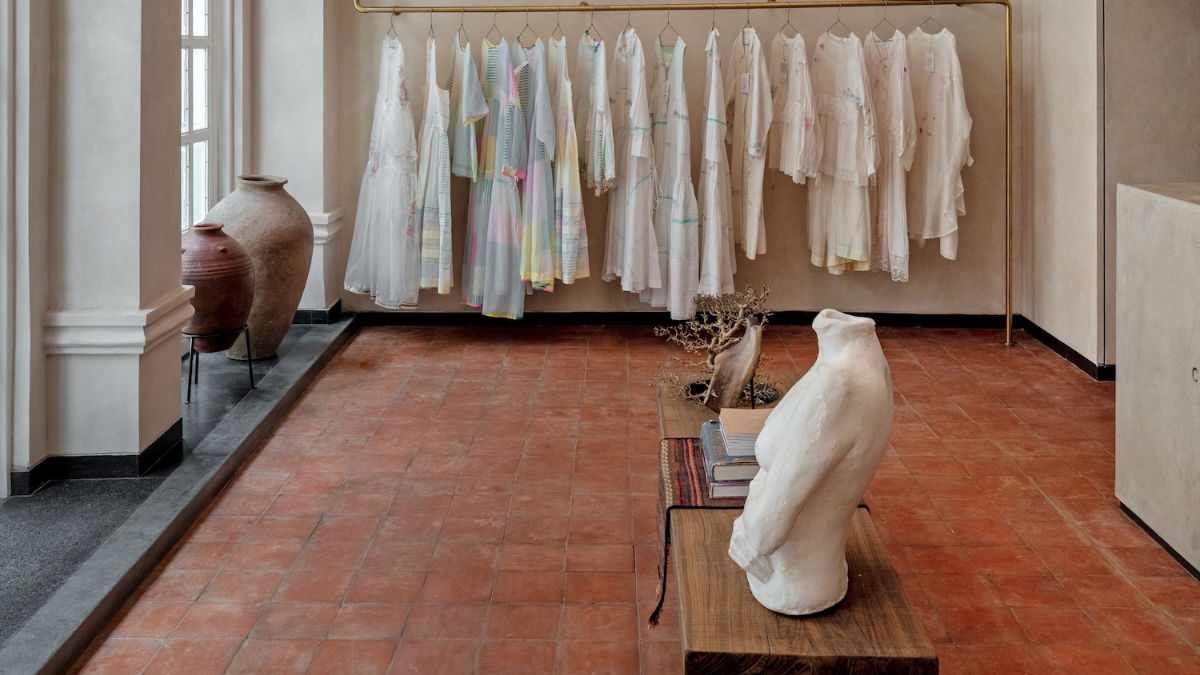Minimalist designer Rina Singh brings together artisanal expertise from across India, collaboratively reviving architectural techniques that are slowly vanishing. She wanted to create a timeless space that respects traditional craftsmanship, connects deeply with Indian heritage, and represents EKÁ’s quiet elegance.
EKÁ, a textile-led contemporary design studio by minimalist designer Rina Singh in the heritage precinct of Kala Ghoda, Mumbai is a reflection of fine craftsmanship and sustainable fashion. This significant milestone echoes the brand’s unwavering commitment to timeless design, sustainability, and the profound artistry of Indian craftsmanship, marking nearly a decade and a half of EKÁ’s journey. A conversation with the founder of the label EKÁ during the recently held Lakmē Fashion Week x FDCI, minimalist designer talks about Indian craft and more.
Celebrating craftsmanship and heritage
It’s a welcoming, minimalistic expression of her design philosophy, thoughtfully balancing nostalgia and modern aesthetics. Just like her collection, the newly opened Kala Ghoda flagship store captures this very essence, crafted sustainably and respectfully, creating a quiet narrative of Indian excellence
The recently opened EKÁ store’s interiors showcases a harmonious blend of reclaimed wooden textures against crisp white limewashed walls, juxtaposed with antique pieces thoughtfully curated from Southeast Asia, including Sri Lanka. The dramatic roof, created graphically with hundreds of one-inch wooden pieces, further elevates the experience, illustrating EKÁ’s meticulous attention to detail.
Talking about fashion Vs style, Rina Singh says, “I definitely have seen that fashion has become much more inclusive as compared to what it was ten years back. I am seeing fashion which is doing sculptural design, ready to wear and brands that are doing sustainable outfits. Fashion is way approachable and accessible now as compared to what it was years back. There is a space for people like us who are devoted to doing textiles. It’s a very diverse field and youngsters are really pushing the boundary.”
When tradition meets sustainability
Her collection has always been about tradition and sustainability. Be it her collection or the way she has done up her store, it is indeed an embodiment of Rina Singh’s deep-rooted belief in sustainable practices and circularity in design. Rina explains, “The idea of having a physical space just like building a home, EKA cannot be just understood by clothes itself. The whole universe has to speak as to where the concept is coming from. EKA even as a fashion label is very textile oriented. We work a lot with Indian textiles and use a lot of textile techniques as well and contemporise them and modernise them, make them more wearable for the global audience. I felt while doing up the store that it should also represent that ideology like who is the designer?”
The materials, textures, and colours selected for the store evoke nostalgia, balanced by modern minimalism and universal appeal. Traditional Indian handcrafted architectural techniques such as lime washed walls, Kadappa stone flooring, handmade terracotta tiles, Bajra glass, and concrete evoke memories of classic Indian homes while presenting a distinctly contemporary aesthetic.
Believing in Indian design aesthetics
If that space is for Indian designs, then also the architecture has to be Indian. Rina adds, “We did look at a lot of Indian craft led architecture. For example, limestone for the wall, terracotta tiles for the floor, using a lot of old wood and refurbishing it, collecting a lot of Indian antic artworks and using it as display units. We totally believe in the Indian design aesthetics. And I don’t think we have pushed it enough to the world and whatever we have we have stereotyped it. so kind of building a universe for that was very important.”
Reducing carbon footprints
Sustainability sits at the heart of her design. Wood has been consciously reclaimed and repurposed, resonating with EKÁ’s philosophy of reusing and reinterpreting materials. The deliberate choice of brass, iron, stone, and clay further highlights EKÁ’s sustainable commitment, creating a warm, inviting space.
Further talking about sustainable fashion, Rina further explains, “If you look at the whole ecosystem of Indian design, I think everything was meant to be sustainable, nothing, neither in architecture, nor in food, nor in clothing, fashion. If you look at her traditional cooking too, it’s slow cooked and slow made that nothing was meant for instant consumption and instant waste. We weren’t creating waste largely as a country ever in our history. So if we only carry forward some of the principles of what is India design, I think it will lead us into sustainable design anyhow.”
Say ‘NO’ to fast fashion
When it comes to textile design there is a whole library that Rina explores, for example, block printing or weaving, or Jamdani, these are so dexterous and time consuming, there is no way I’m going to make fast fashion clothes out of it. Her clothes aren’t cheap and that is for a reason too. “You just buy things that you don’t need, only because it is cheap. But when I think the price tag is right, I’m not saying expensive or whatever, then you become a conscious consumer.” A piece of textile needs to be passed on as heirlooms to the family from one generation to another.
Lachmi Deb Roy is the Entertainment Editor of Firstpost, Network18. She reviews films and series with a gender lens. She is a 'Rotten Tomatoes' certified critic. Her interviews are called 'Not Just Bollywood' because she takes a huge interest in world cinema. She has been the winner of the prestigious Laadli Media and Advertising Award for Gender Sensitivity for two consecutive years, 2020 and 2021. OTT over theatrical releases is her preference unless and until it's a King Khan film. She takes interest in fashion, food and art reviews too.
)